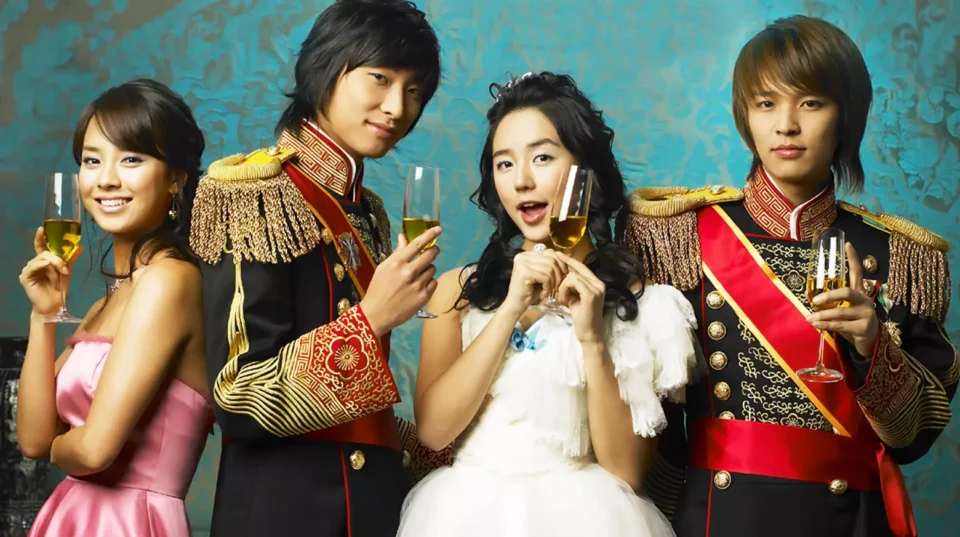K-Drama Flashback: ‘Princess Hours’
‘Princess Hours’ encourages faith in improbabilities, relationships, and love. It’s a K-drama of tropes, but the predictability satisfies

From left to right: Song Ji-hyo, Ju Ji-hoon, Yoon Eun-hye, Kim Jeong-hoon in Princess Hours. Photo courtesy of MBC
The thing is, I believe that an engaging story with much narrative richness is worth revisiting. It’s almost as if you’re returning to an established, familiar comfort zone. That’s how Princess Hours defines itself for me—a classic love story never aging or ceasing to please. It was the 10th most-watched K-drama of 2006, starring Yoon Eun-hye, Ju Ji-hoon, Kim Jeong-hoon, and Song Ji-hyo; Princess Hours evolved into a cultural phenomenon, catalyzing the Hallyu wave while also spawning remakes, musicals, and spin-offs as a result.
I distinctly recall how much I liked Yoon Eun-hye seeing what she did as Shin Chae-kyong! “Look at how much discomfort and anguish she’s in,” I was thinking. “She is making it through everything!” I was drawn to that. I suppose that’s when I fell in love—and not just with her, but also with the other characters and the drama all around. Some may dismiss it as cheesy, dramatic, and riddled with clichés and conventional wisdom, but I reckon that its predictability makes for satisfying experiences.
Princess Hours has Chae-kyeong, a mere high school art student. One day, to her disbelief, she figures that her grandfather had stipulated she must marry Crown Prince Lee Shin (Ju Ji-hoon), who attends the same school. Despite her refusal, Chae-kyeong feels obliged to wed him to make things better for her family. She endures challenges with acclimating to her cranky husband and the protocol and royal obligations of life in the palace up until Lee Shin’s cousin and second-in-line to the throne, Prince Lee Yul (Kim Jeong-hoon), walks into the picture. Although she’s fairly certain that Lee Yul will stand by her, she can’t help worrying about her conceited, cold husband.
As what follows grows more complex, we encounter Lee Yul’s mother, Lady Hwa-young (Shim Hye-jin), attempting to reclaim her son’s right to the crown. The myriad controversies involving the royal family compound the events that lie ahead. Lee Yul grows feelings for Chae-kyeong, while Lee Shin maintains his clandestine liaison with his ex-girlfriend, the ballerina Min Hyo-rin (Song Ji-hyo). In the event of things getting out of hand, the royal family steps in to make things right, and this is when the newlyweds start falling for each other.
Chae-kyeong is vivacious, attractive, and endearing, notwithstanding her awkward gait and lack of elegance and grace. That’s just what makes her speak to me—she doesn’t want to be something else or the stuff of royalty. Lee Shin, on the flip side, embodies the quintessential haughty prince—a dreamboat, ubiquitous, and overbearing all in one. But when the two are together, they exemplify the adage “opposites attract” while remaining at variance with each other. Perhaps the intricate treatment of this gorgeous slow-burn romance is what sets Princess Hours apart from others in the genre. You’ll enjoy how an impetuous relationship matures into an inspiring, beautiful love story for the two protagonists.
Ju Ji-hoon and Yoon Eun-hye’s innate acting effectively captures the growing intimacy and romantic tension over time. You must tune into Princess Hours for vivid instances of unspoken pain, animosity and affection, resentment and hidden jealousy, and an urgent desire for each other’s concern and companionship. Also infused with Korean Confucianism—family traditions, cultures, trust, filial piety, and responsibilities—this drama chronicles the growth of characters as it revolves around these themes.
In the process of outlining classic Confucian ideals and sophisticated Western values that interact with contemporary Korean culture, the Hwang In-roi-directed series offers scenarios of a coming-of-age narrative with virtually all the ingredients of a mainstream love story. It spotlights a Korean way of life, serving to reaffirm individuals’ reverence for elders and an understanding of how vital social order is. That being said, it’s fundamentally the iconic romance K-drama where the leads stay true to their feelings of love through the very end, within a culture that places materialism and power above all else and seemingly belittles emotions.
The drama’s lingering OST, precisely timed with its emotional severity, was likewise noted for its excellence. The playlist’s evergreen hit “Perhaps Love” remains my favorite. Stream below:







